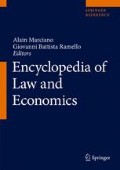Abstract
Bounded rationality (BR) is the idea that when individuals make decisions, they are “bounded” or limited because of inadequate information, cognitive limitations inherent in the human mind and time constraints. This type of rationality describes broad areas of social and economic action, in which rational utility-maximizers faced with complex situations are required to make less-than-perfect choices (satisficing rather than optimizing). BR is one of the cornerstones of rational choice theory and it informs many scientific fields, spanning from mathematic and economic psychology to political economy and managerial economics. This entry discusses the general aspects of BR, focusing on how cognitive biases affect the decision-making of rational agents faced with the costs of acquiring, absorbing and processing information. It also presents an overview of BR’s current applications in various fields of economic activity.
Access this chapter
Tax calculation will be finalised at checkout
Purchases are for personal use only
References
Aharoni Y, Tihanyi L, Connelly BL (2011) Managerial decision-making in international business: a forty-five-year retrospective. J World Bus 46(2):135–142
Akerlof GA (1970) The market for ‘lemons’: quality uncertainty and the market mechanism. Q J Econ 84(3):488–500
Baron J (2007) Thinking and deciding, 4th edn. Cambridge University Press, New York
Basel JS, Brühl R (2013) Rationality and dual process models of reasoning in managerial cognition and decision making. Eur Manag J 31(6):745–754
Foss NJ (2001) Bounded rationality in the economics of organization: present use and future possibilities. J Manag Gov 5(3–4):401–425
Garcia-Retamero R, Takezawa M, Galesic M (2010) Simple mechanisms for gathering social information. New Id Psychol 28(1):49–63
Gifford S (1999) Limited attention and the optimal incompleteness of contracts. J Law Econ Organ 15(2):468–486
Gigerenzer G, Reinhard S (eds) (2001) Bounded rationality: the adaptive toolbox. MIT Press, Cambridge
Güth W (2000) Boundedly rational decision emergence – a general perspective and some selective illustrations. J Econ Psychol 21(4):433–458
Hart O (1995) Firms, contracts, and financial structure. Clarendon, Oxford
Heap SH, Hollis M, Lyons B, Sugden R, Weale A (1992) The theory of choice: a critical guide. Blackwell, Oxford
Kahneman D (2003) Maps of bounded rationality: psychology for behavioral economics. Am Econ Rev 93(5):1449–1475
Pita J, Jain M, Tambe M, Ordóñez F, Krau S (2010) Robust solutions to Stackelberg games: addressing bounded rationality and limited observations in human cognition. Artif Intell 174(15):1142–1171
Rapoport A, Dale PS (1967) The “end” and “start” effects in the iterated Prisoner’s dilemma. J Confl Resolut 11:354–462
Reis R (2006) Inattentive consumers. J Monet Econ 53(8):1761–1800
Riedl DF, Kaufmann L, Zimmermann C, Perols JL (2013) Reducing uncertainty in supplier selection decisions: antecedents and outcomes of procedural rationality. J Oper Manag 31(1–2):24–36
Rosenthal RW (1981) Games of perfect information, predatory pricing, and the chain store paradox. J Econ Theory 25(1):92–100
Rosenthal RW (1989) A bounded-rationality approach to the study of noncooperative games. Int J Game Theory 18:273–292
Rubinstein A (1998) Modeling bounded rationality. MIT Press, Cambridge, MA
Sah RK, Stiglitz JE (1985) Human fallibility and economic organization. Am Econ Rev 75(2):292–296
Selten R (1978) The chain store paradox. Theory Decis 9(2):127–159
Simon HA (1955) A behavioral model of rational choice. Q J Econ 69(1):99–118
Simon HA (1982) Models of bounded rationality: behavioral economics and business organization, vol 2. MIT Press, Cambridge, MA
Stahl DO, Haruvy E (2008) Level-n bounded rationality and dominated strategies in normal-form games. J Econ Behav Organ 66(2):226–232
Thaler RH, Sunstein CR (2008) Nudge: improving decisions about health, wealth, and happiness. Yale University Press, New Haven
Tisdell C (1996) Bounded rationality and economic evolution: a contribution to decision making, economics and management. Edward Elgar, Cheltenham
Todd PM (2007) How much information do we need? Eur J Oper Res 177(3):1317–1332
Tsaoussi A, Zervogianni E (2010) Judges as satisficers: a law and economics perspective on judicial liability. Eur J Law Econ 29(1):333–357
Tversky A, Kahneman D (1981) The framing of decisions and the psychology of choice. Science 211(4481):453–458
Tversky A, Kahneman D (1986) Rational choice and the framing of decisions. J Bus 59(4):251–278
Williamson OE (1985) The economic institutions of capitalism. Free Press, New York
Yao J, Li D (2013) Bounded rationality as a source of loss aversion and optimism: a study of psychological adaptation under incomplete information. J Econ Dyn Control 37(1):18–31
Author information
Authors and Affiliations
Corresponding author
Editor information
Editors and Affiliations
Rights and permissions
Copyright information
© 2019 Springer Science+Business Media, LLC, part of Springer Nature
About this entry
Cite this entry
Tsaoussi, A. (2019). Bounded Rationality. In: Marciano, A., Ramello, G.B. (eds) Encyclopedia of Law and Economics. Springer, New York, NY. https://doi.org/10.1007/978-1-4614-7753-2_106
Download citation
DOI: https://doi.org/10.1007/978-1-4614-7753-2_106
Published:
Publisher Name: Springer, New York, NY
Print ISBN: 978-1-4614-7752-5
Online ISBN: 978-1-4614-7753-2
eBook Packages: Economics and FinanceReference Module Humanities and Social SciencesReference Module Business, Economics and Social Sciences

